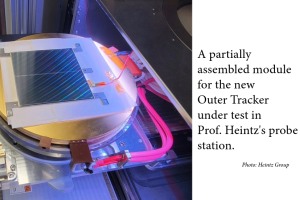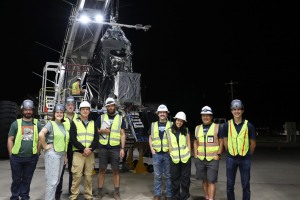From research at CERN and hands-on detector design to courses such as Applied Artificial Intelligence (AI) and Machine Learning (ML) in Physics, many academic and research opportunities are unique to the Brown experience.
Assistant Professor Loukas Gouskos: PHYS 2550
"Applied Artificial Intelligence (AI) and Machine Learning (ML) in Physics is a graduate-level course at Brown University designed to engage students in the intersection of AI/ML and cutting-edge physics research. While my own research is in experimental particle physics, it is intentionally broad, incorporating topics and final projects from multiple areas of physics, including astrophysics, condensed matter, and beyond. What distinguishes PHYS 2550 is that students do not merely acquire AI/ML techniques; they develop the ability to integrate AI into real research projects, gaining hands-on experience in applying state-of-the-art ML to some of the most pressing challenges in physics today. The final projects are based on active research problems, allowing students to contribute directly to the advancement of their fields. Several projects initiated during the first offering in 2024 have already yielded publication-quality results and are evolving into key components of students' Ph.D. research, demonstrating the impact of the course.
A key takeaway from PHYS 2550 is that AI is a powerful tool, but its true potential can only be fully realized with deep physics knowledge. Students come to appreciate that understanding the underlying physics is essential to effectively exploit the potential of AI for scientific discovery. Brown University provides a unique environment for this kind of interdisciplinary learning, combining its reputation as a world-class institution with the benefits of a relatively compact academic setting. This allows students to interact closely with faculty, receive individualized mentorship, and engage deeply with research at the intersection of AI and physics. PHYS 2550 is one demonstration of Brown's commitment to advancing innovation, equipping students with both the technical skills and the scientific insight to push the boundaries of knowledge in academia and industry."
"Even after leaving academia, former students stay in touch to discuss how the concepts learned in PHYS 2550 apply to their work in industry and other fields. Their continued interest in the course material reflects its broad applicability and the valuable skills it provides for a wide range of careers." - LOUKAS GOUSKOS
—————————————————————————
Professor of Engineering and Physics Alexander Zaslavsky: PHYS1590/2590
—————————————————————————
Associate Professor of Engineering and Physics Domenico Pacifici
"The educational and professional benefits of taking PHYS 1790/2790 are myriad—and can only be found at Brown Physics. Quantum optics is at the heart of modern physics and cutting-edge technologies, including quantum computing, quantum cryptography and high-precision measurements. Students will gain a solid foundation in the fundamental principles governing the quantum nature of light and its interactions with matter. Through rigorous yet accessible discussions on topics such as single-photon generation, non-classical quantum states, quantum photodetection, and the building blocks of quantum computing circuits, students will develop a deeper understanding of quantum mechanics in a practical, application-driven context. The course’s self-contained structure ensures that even those without an extensive quantum mechanics or optics background can grasp and apply these concepts effectively.
From a professional standpoint, this course provides valuable skills for students aspiring to work in research, academia or high-tech industries. A key component is the study of quantum gates and circuit elements, offering students direct insight into the principles of quantum computing. With the increasing global demand for expertise in quantum technologies, familiarity with quantum optics and quantum information processing opens doors to careers in quantum computing, photonics, telecommunications, and beyond. Students will develop problem-solving and analytical skills that are highly sought after in both theoretical and experimental fields. Whether aiming for a career in quantum research or looking to broaden their knowledge in modern physics, this course offers a unique opportunity to engage with one of the most rapidly advancing areas of science and technology."
—————————————————————————
Assistant Professor of Physics (Research) Adrien Rosuel: PHYS1590/2590
"Quantum information is currently a vast and hot topic in academia and industry, at the heart of the second quantum revolution, with astonishing promises of developing unprecedented computing power, highly secure communications, new materials, extremely sensitive sensors, and more. Quantum information touches nearly all areas of science and engineering, making it hard to see the big picture sometimes.
This course returns physics to the center of quantum informationand demystifies it. This “physics point of view” highlights the common feature of all the quantum information promises: quantum control, or how to manipulate quantum systems to get the desired output. The main objective is to get a better vision of all areas of science impacted by quantum information and a better understanding of the quantum technologies used in academia and industry to achieve quantum computation or sensing by emphasizing their common features."

